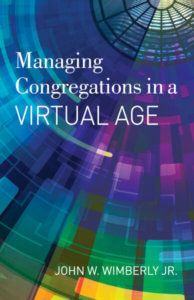Evaluating church staff by measures related to their own individual performance can lead to ministry silos, says John Wimberly. When every staff person’s ultimate goal is the overall mission, a church is far more likely to make progress.
How does a staff person’s work relate to the broader mission of a congregation? When the expectations for every job relate to the purpose or mission of a congregation, we prevent areas of ministry from becoming isolating silos. We evaluate the success of a congregation based on performance measures for an overall ministry, not silo by silo or individual performance measure by individual performance measure.
Are individual performance measures linked to mission?
A pastor may be given a performance measure to “preach inspiring sermons.” She may succeed spectacularly in achieving the performance measure. But if the performance measure for the congregation is growth in membership and the congregation is declining in membership, what does that tell us? It tells me that inspiring, motivating sermons are not the key to congregational growth in this particular congregation. Obviously, I don’t want the pastor to stop preaching great sermons. But if we want to grow the congregation, we need to look elsewhere for strategies. The great sermons may also need to be linked to an additional congregational purpose, such as the spiritual growth of its members.
Performance measures can be misleading when applied narrowly to areas of ministry. It is fairly common to find expectations for a music ministry related to producing beautiful music in worship. As a result, the people producing the music can live in a music silo and not worry about how the rest of the ministry is faring. I observe this in congregation after congregation. Clients regularly say, “We are declining in membership, but we have great music.” Apparently, as the RMS Titanic sank, the musicians on the ship’s deck played beautiful string music. Despite the beautiful music, the ship still sank! If a congregation’s goal is to grow its membership, for example, it might consider other strategies to link music to its purpose of growth. One congregation had a strategy for the congregation’s music ministry to produce beautiful music for the community, not just for worship, in hopes that music lovers outside the church might come inside.
When the expectation is that the music ministry will produce inspiring music as part of an overall effort to attract visitors to the church, everything changes. The music ministry now has a stake in engaging people who are not members of the congregation. They can ask, how does music engage first time visitors to our church? How might our music ministry be active in the community, raising the profile of our congregation? Does our music appeal to the increasingly diverse (racially, generationally, unchurched, and otherwise) people who have moved into the surrounding neighborhood? At minimum, linking music ministry to the overall goals of a congregation to grow will give the musicians a reason to get involved in brainstorming about factors that will contribute to the congregation’s growth.
Avoid programmatic silos.
The same approach needs to be applied to other traditional programmatic silos in congregations: religious education, youth ministry, and mission. If the purpose of a church is to reach more people with the gospel, we cannot say, “That is someone else’s problem. We are doing our job.” No, realizing the stated purpose of the congregation is a responsibility for everyone on the staff team, lay leaders, and members.
If every staff person’s ultimate goal is the same (the mission/purpose statement of the congregation), a congregation is more likely to make progress toward the goal. If expectations, however, are for each individual staff person to succeed by meeting certain performance measures, regardless of whether the ministry succeeds, the ministry will quickly devolve into silos, some of which are successful, some of which are not.
 This article is excerpted from Managing Congregations in a Virtual Age by John W. Wimberly, Jr copyright © 2021 Fortress Press. Used by Permission. The book is available at Fortress Press, Cokesbury, and Amazon.
This article is excerpted from Managing Congregations in a Virtual Age by John W. Wimberly, Jr copyright © 2021 Fortress Press. Used by Permission. The book is available at Fortress Press, Cokesbury, and Amazon.
Related Resources
- LPLI Staff Version — A 360-degree leadership assessment instrument custom designed by the Lewis Center for church staff and other religious professionals
- 5 Ways to Help Church Staff Succeed by Ann A. Michel
- 5 Reasons Churches Suffer Management Chaos by Rich Sider






